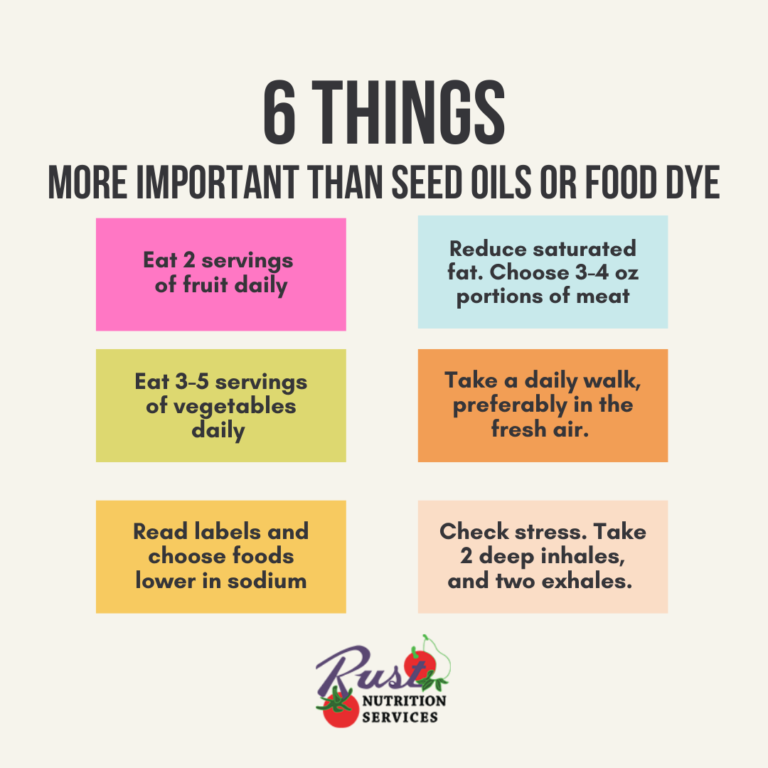Misinformation about food ingredients is a cause for concern and I fear the trend will continue in 2025.
Whether it’s using “seed oils” (vegetable oils like canola, soybean, sunflower) or eating foods with artificial food coloring, these topics have continued to cover the social media feed in distorted ways. Is there really a concern?
I have written about seed oils before, as have many my colleagues. Social media personalities, many without any nutritional training or clinical background, like to hold a conspiracy or two and rant about them. The goal is generally to grab your attention, instill fear in the subject or ingredient, and then lure you into buying their alternatives. They often sell nutritional supplements or maybe they are affiliated with an alternative brand.
Food dyes
Food dyes are used by the food industry and home cooks, to enhance the natural color of a food or product, or to add decoration and an element of fun to colorless foods (I don’t want to live in a world without colored sprinkles). Like oils, it’s the amount and frequency of use of these types of products. Colorants come from both natural and synthetic sources. All color additives are approved by the FDA before being used in food. The first three used are Red 40, Yellow 5, and Yellow 6. However, the FDA is reviewing Red Dye 40, so we’ll see where that goes. Again, like dietary fat, the problem is the total portion or amounts of food you consume with dyes.
All the evidence shows that food dyes do not cause cancer or behavioral problems. Overall, I don’t think food dyes are a concern, but I would advise cutting back on colorful foods or drinks and focusing on whole foods instead. However, enjoying a colored drink or a colorful bowl of cereal is not going to put your health at risk. The issue is whether you drink three 16-ounce servings of a red drink every day or whether you drink a 16-ounce serving twice a week. That’s the difference – frequency and portion.
Reframing Your Year: Less Hype, More Focus
I’m not big on decisions, however I believe in intention. Instead of worrying about individual ingredients, consider focusing on habits that really matter. Think about what you would like to improve in your life. Instead of clinging to and fearing seed oils, food dyes, or some other ingredient in your diet, focus on some daily habits that have scientific evidence behind them, showing that they support health and reduce the risk of disease.
6 habits to improve your overall health:
- Eat two or more servings of fruit daily. Choose what you like, but consider including berries. Blackberries, raspberries and strawberries are a good source of vitamin C and other antioxidants known to support brain and heart health. All types of fruit provide potassium, which helps with regulation blood pressure.
- Include 3 to 5 servings of vegetables each day. This may seem like a lot, but one serving is about 1/2 cup. You can easily enjoy 2 servings in a side salad. You can add spinach to your morning eggs, add diced tomatoes to sandwiches, roast vegetables to add to soups or chili and easily end up with 5 servings throughout the day.
- Read labels for sodium. Some people can handle higher amounts of sodium in their diet, but as you choose packaged foods, start checking the sodium content. Compare brands and choose the lower sodium option when possible. High-sodium diets are a problem for people with high blood pressure (adding more fruits and vegetables and cutting back on sodium are the top blood pressure-lowering habits for people with hypertension).
- Eat less saturated fat. When you take a look at the label, also get a top amount of saturated fat. Overall, less than 10 percent of your calories should come from saturated fat. When you look at the label, check the “Daily Value”. If it’s 20% or more, that food is high in saturated fat. Look for less than 5%. Research is ongoing on the risk that saturated fat may have for heart disease, but there is clear evidence that saturated fat increases “bad” cholesterol (LDL). Generally, it’s not so much about the type of fat, but the amount that is consumed. You may think of olive oil as a healthier choice than butter or beef fat, but you should limit the amounts you consume. This means fewer fried foods, fewer packaged baked goods (often made with saturated fat) and smaller portions of oils or butter used in cooking.
- Work in more everyday traffic. Walking 30 minutes daily is a good habit. If you are out of shape, start slow and gradually increase your pace over weeks. I recommend getting outside for fresh air whenever possible. Even if it’s just a 15-minute jaunt, the air and traffic are good for you. Plan your move. It’s easy to justify why you can’t fit it. Put it on your calendar (Tuesday and Thursday mornings from 7:30 to 8:00 am). Try to fit it into your breakfast, because there are fewer things that can affect it.
- Think about your stress. We all have stressors in our lives. Identify what you’re struggling with and then create a plan to handle it stress it is important for your overall health. Deep breathing exercises they really help. When you feel overwhelmed, pause and take two to three deep breaths and exhale. This practice helps you calm your body within minutes. If you’re really struggling, reach out to a therapist or trusted family member or friend for support.

